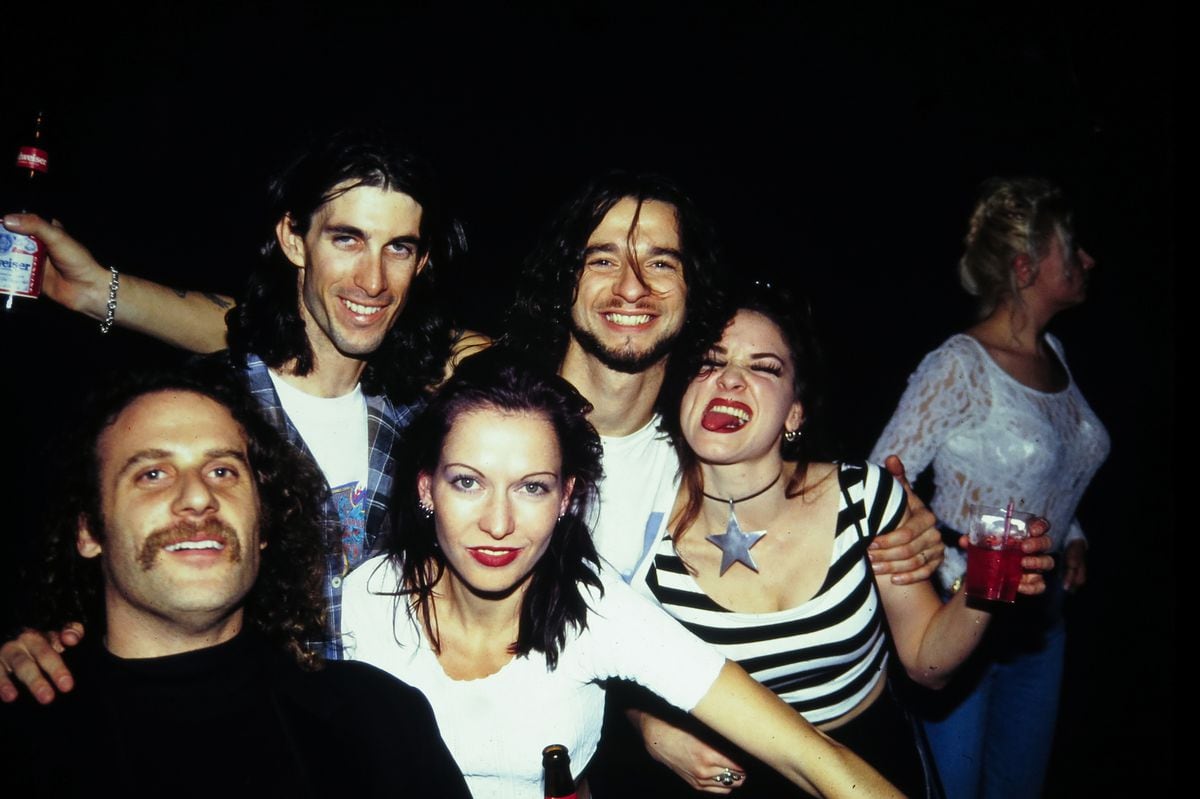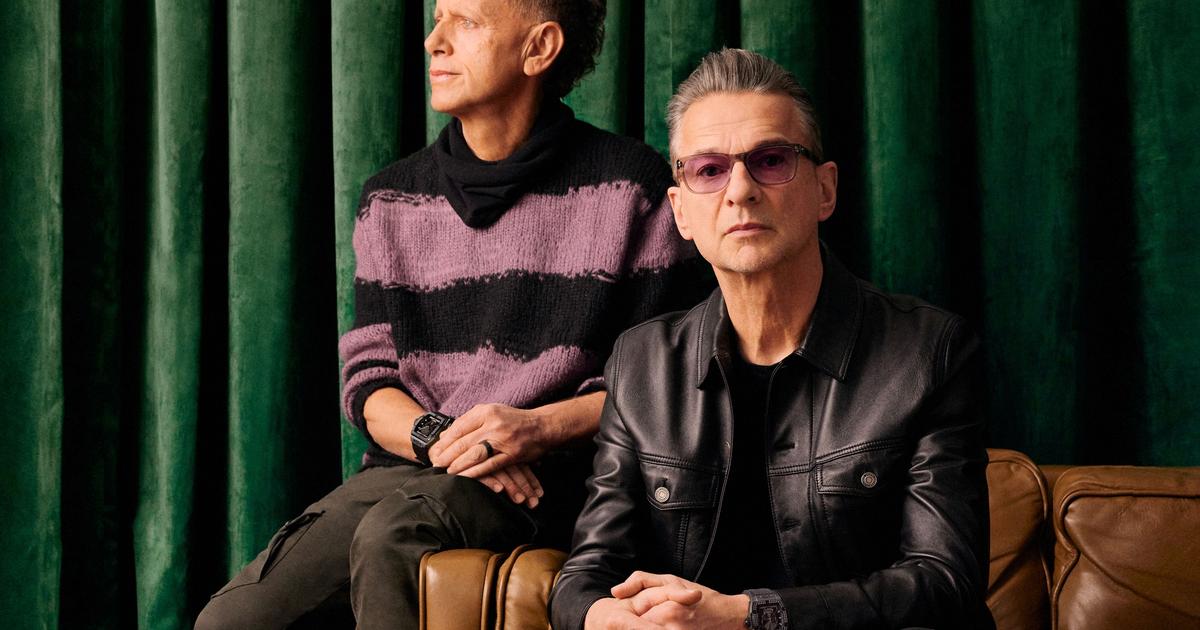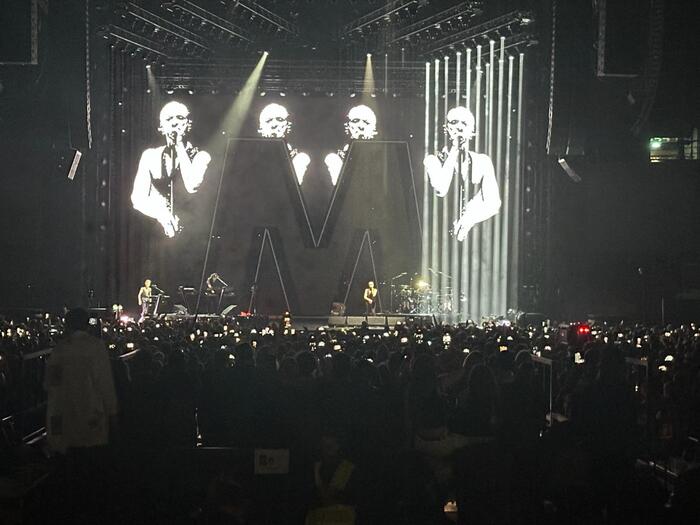When some fans saw the members of Depeche Mode shopping at the Continente hypermarket in Alcobendas (Madrid) they couldn't believe it.
It was the year 1992, and the band from Basildon (United Kingdom) was one of the biggest of the moment.
Their last album at that time,
Violator
, had been number 1 in half the world (including Spain) and the popular fervor they aroused was one of the most intense on the planet.
But, in that pre-internet age, things could still be done half-secretly.
When recording their highly anticipated new album, which was to be the eighth of their career, the British quartet decided to change their method.
The producer, Flood, has just recorded
Achtung Baby
with U2 in Berlin.
Bono and company had isolated themselves from their natural environment and locked themselves up to live and record in another country, with outstanding results.
If that was the album that reinvented the Irish,
Songs Of Faith And Devotion
was intended to play the same role in the career of Depeche Mode, although the turn would be the reverse: instead of going from rock to electronica, the techno heroes pop were going to embrace electric guitars.
Not without internal debate.
The rock impulse came from its singer, Dave Gahan, who had settled in Los Angeles and had become hooked on the sounds of Jane's Addiction, Nirvana, Soundgarden and Neil Young.
He too had radically changed his image: he was very thin, sported a beard and long black hair, and his skin had been covered in tattoos.
Upon arriving in Madrid, many did not recognize him.
The band landed in the capital of Spain in February 1992, and set up their home-studio in a chalet in the exclusive urbanization of La Moraleja.
Why Madrid?
There are several theories about this.
In an article at the time in EL PAÍS, Diego A. Manrique stated that the motivation was to save taxes.
The writer and journalist Elena Cabrera, author of the book
Depeche Mode.
Los últimos amantes
(La Máscara, 1999), points out that in her record company "they looked for options for places in Europe where they could be calm and live and record at the same time, and this seemed the best to them".
Juanito Torpedo (left) with Depeche Mode during a meeting with the press prior to their concert at Pachá auditorium on March 8, 1984. Photo by Manuel Navarro, courtesy of Juanito Torpedo.
The most general opinion: that the attractiveness of the Madrid nightlife was what tipped the scales in their favor.
The Depeche idyll with the city came from afar: in the middle of the Movida, they had performed two nights in a row at the emblematic Rock-Ola venue in 1982, when they only had one album, and, two years later, they did so at the Escuela de Caminos .
Those appearances were very influential in the technopop environments of the city, as the journalist signed.
“They have always had good memories of the concerts in Madrid, they know that they have a very loyal audience here.
Not all cities fill the same stadium two nights in a row, as is often the case here with the Palacio de Deportes.
But the memory of the days of the chalet is not idyllic for them.
The idea of living together and recording at the same time was not the best.
Dave Gahan would lock himself in his room all day, paint in a room with candlelight, and go out alone at night to sing.
Martin Gore [guitar and keyboards] drank a lot.
Alan Wilder [keyboards and drums] was mad… It was hell for the band.”
Crisis in the chalet, parties in the Madrid night
The one in La Moraleja was a spacious chalet, with large glass windows, which someone from the group's environment defined as "similar to Scarface's mansion."
Although they begged that the location not be leaked, as Wilder confessed to Manrique (“We went to Radio Madrid to speak live and in the end so many followers gathered that we could not flee, they got on top of the car and we feared for our lives”) , some followers did find it.
This is the case of Juan García Flores, alias
Juanillo,
head of the group's fan club in Madrid and author of the book
More than 35 years of Depeche Mode
(Bubok, 2017).
“We found out where they were.
La Moraleja was then a private urbanization but with free access, we called the intercom and they let us in when we told them we were representing the fan club”.
The boys had the opportunity to see part of the recording and spend a few minutes chatting with the members of the band, without being aware of the bad atmosphere that existed between them.
Dave Gahan in a moment of the 'Devotional' tour in Brussels on May 25, 1993.gie Knaeps (Getty Images)
However, it was in the nightclubs where Gahan, Gore and the other keyboard player, Andy Fletcher (who died last May), were most visible.
“While Wilder stayed in the studio working with Flood, the rest were seen on several occasions in the Morocco room, which was then run by Alaska, always in a VIP area, and in nightclubs like Archy or Oh!
Madrid.
There was also news of a confrontation between Dave Gahan and some angels from hell at the doors of a room and they almost stopped him”, points out Juanillo.
The band was based in Madrid for four months, with a break in April that the vocalist took advantage of to get married in Las Vegas for his second marriage.
Gahan, then 29, had just divorced his first wife.
On the
Violator
tour, he had already begun to give himself completely to the night and its excesses.
He arrived in Madrid hooked on heroin, which, added to the enormous creative differences between Gore and Wilder, fueled the tension between all the members of the group.
The latter already made the decision that, as soon as the subsequent tour ended, he would leave Depeche Mode.
"We couldn't bear to be in the same room together, and I swore to myself that I would never make a record under those circumstances again," he declared.
He added, however, that they were "in the worst situation as members of the group", but that's where some of his best work came from.
Martin Gore, Dave Gahan and the late Andrew Fletcher, during a 2012 press conference in Paris. Pascal Le Segretain (Getty Images)
Indeed.
Gahan turned all that into some vocal performances that can be considered the best of his life, and
Songs Of Faith And Devotion
was a critical and commercial success: it sold four million copies and was his first album to rise directly to number 1 on the chart.
United Kingdom and USA (in Spain it stayed at 2).
“It is his latest masterpiece,” says the cultural critic and fan of the group, Óscar Cabrera.
Devotional
, the tour that almost killed them
Not all
Songs Of Faith And Devotion
was recorded in Madrid.
The band finished recording in Hamburg.
They did not return to Spain until July 1993, already with the album tour.
The famous
Devotional Tour
passed through a city as unusual as Pontevedra (barely three thousand people attended a desolate stadium in Pasarón), as well as Madrid (Plaza de Toros de Las Ventas) and Barcelona (Palau Sant Jordi).
Alberto Monreal, then head of the influential fanzine
Maldoror
and currently the podcast
Pobres chavales
, witnessed the last two concerts.
“On every tour Dave was more horny, and here he was on top of it, he kept moving, he didn't stop.
He was all the time dancing and yelling and waddling, he looked like a devil.
He was the best
frontman
in the world at the time.
It was an overwhelming spectacle, they gave it their all.
It was a wounded band, we knew nothing about Dave's addiction or the problems between them, but live they were a steamroller.
What was perceived on stage contrasted with what was happening off stage.
So much so that the
Devotional Tour
was defined by the British magazine Q as "the most depraved rock tour of all time".
It was the most extensive in the group's career: 158 concerts in 27 countries, throughout the five continents during 14 months for a total of two million people.
They were accompanied on the tour by a team of 120 people, including a full-time psychiatrist and dealer.
It is said that the parties that followed the concerts were truly wild.
A good indicator of this is that the opening acts for a large part of the tour, Primal Scream (not exactly self-righteous) were scared by what they saw.
The original members of Depeche Mode pictured in Tokyo in the summer of 1986.Koh Hasebe/Shinko Music (Getty Images)
Various witnesses told stories of orgies, vandalism and exacerbated drug use.
Gahan was thrown out of a hotel in Berlin and arrested in Montreal for assaulting a concierge.
In New Orleans he suffered a cardiac arrest in the middle of a concert due to an overdose.
Every night they gave him cortisone shots to be able to perform.
Gore was also arrested in Denver for disorderly conduct, and in Los Angeles, he suffered from seizures and lost consciousness.
Fletcher was hospitalized for a nervous breakdown in South Africa and ended up leaving the tour due to depression.
He was admitted to The Priory clinic in London, where he lamented the consequences that alcohol and drug abuse had left him in Madrid.
In the final part of the tour, Gahan bit a journalist on the neck because he was convinced he was a vampire, and ended up hospitalized again, this time for breaking several ribs, after taking a bad jump from the stage.
"None of us were ever the same after that tour," Gore confessed.
At the end of it, it was assumed that Depeche Mode had disbanded.
Alan Wilder officially announced that he was leaving the group in 1995, Gahan attempted suicide once and came close to death from another overdose.
Gahan and Gore, the last
tour
?
Now as a trio, the group went ahead with the publication of
Ultra
in 1997, but "after Wilder's departure, nothing was the same," says Óscar Cabrera.
“His work was vital in the studio and fans say his absence was the cause of the group's decline.
I think that the reason that Depeche make worse records every time is the same as in all rock groups: age.
It is ridiculous to demand that a group of sixty-year-olds make history again.
They already did it.
They changed the music of their moment, and that is within the reach of very few”.
Already clean and focused, Depeche Mode standardized.
In the 21st century, their usual dynamic has been to get together to publish an album every four years and announce their respective tours in a massive press conference.
They have recorded seven more albums after
Songs Of Faith And Devotion
, but the sad news comes with
Memento Mori
.
His next work, due to be published on March 17, is weighed down by the death of Andy Fletcher due to an aortic dissection.
The now duo will present it on June 2 at Primavera Sound in Barcelona, and on the 9th in the Madrid edition of the festival, 30 years after their mythologized visit to the
Devotional
.
“I have a hard time imagining a live show without Andy Fletcher”, says Elena Cabrera.
"It's probably the last tour, maybe there's a certain farewell scent to it."
You can follow ICON on
,
,
, or subscribe here to the
Newsletter
.








/cloudfront-eu-central-1.images.arcpublishing.com/prisa/BJGT2PB7CFFSZNXH3433MRZNKE.jpg)





